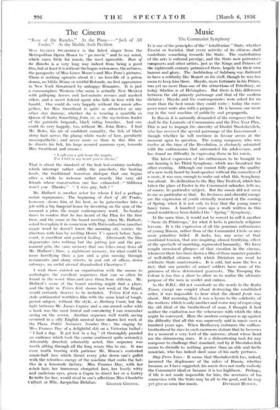Music
The Communist Symphony
IT is one of the principles of the " totalitarian " State, whether Fascist or Socialist, that every activity of its citizens shall contribute something towards the State. The contribution of the arts is cultural prestige, and the State now patronises composers and other artists, just as the Kings and -Princes of the eighteenth -century patronised them, largely for their own honour and glory. The Archbishop of-Salzburg was -flattered to have a celebrity like Mozart on his staff, tkongh.he-was too mean to keep him there. Haydn, more fortunate in his Prince, was yet no more than one -of the -attractions of Esterhazy, as today Sibelius is of Helsingfors. But there is this difference .between the old princely patronage and that of the modern dictator : Haydn and his contemporaries were asked for no more-than the best music they could write ; today the com- poser. must -write also with a purpose. He is become one more cog in the vast machine of publicity and propaganda.
In Russia it is naturally demanded of the composer that he shall be the Laureate of Communism and the Five Year Plan. This is not to impugn the sincerity of Dmitri Shostakovitch, who has received the special patronage of the Government— though whether he will continue in favour seems at the moment open to question. The young composer, who was twelve at the time of the Revolution, is obviously saturated with the enthusiasms that surrounded his adolescence, and has found no difficulty in expressing them in his music.
The latest expression of his enthusiasm to be brought to our hearing is his Third Symphony, which was broadcast the other evening. Although one cannot fully gauge the quality of a new work heard by loud-speaker without the corrective of a score, it was easy enough to make out what this Symphony was about. Its dedication to the May Day Festival, which has taken the place of Easter in the Communist calendar, tells us, of course, its particular subject. But the music did not seem to me as particular as that. Its freshness and cheerful energy are the expression of youth eternally renewed at the coining of Spring, when it is not only to love that the young man's fancy turns. A hundred years ago a work written in this mood would have been dubbed the " Spring " Symphony.
At the same time, it would not be correct to call it another " Sacre du Printemps," for what it lacks is precisely religious fervour. It is the expression of all the generous enthusiasms of young Russia, rather than of the Communist Credo or any more primitive belief. It lacks, too, any sense of that emotional tension, that awe-inspiring, almost terrifying, effect of the spectacle of marching, regimented humanity. We have caught occasional glimpses of that emotion in the cinema, whenever there has been shown a film of those monster parades of well-drilled citizens with which Dictators arc wont to celebrate State anniversaries. It is odd, but none the less a fact, that our parades of armed soldiers have none of the grimness of these determined gymnasts. The Trooping the Colour is too fine a show to allow us to realise the ultimate purpose of the men in scarlet and cuirass.
As the B.B.C. did not vouchsafe us the words in the Radio Times, except one couplet about destroying the established order, it was impossible to hear what the choral finale was about. But assuming that it was a hymn to the solidarity of the workers, which is only another and worse way of expressing the old ideal of the brotherhood of man, I thought it had neither the exaltation nor the vehemence with which the idea might be conveyed. Here the modern composer is up against the difficulty- that all this was supremely said in music over a hundred years ago. When Beethoven embraces the million- brotherhood he rises to such enormous stature that he becomes for a moment a very lord of the universe, about whose head are the shimmering stars. It is a disheartening task for any composer to challenge that standard, and by it Shostakovitch seems to dwindle to nothing greater than an able and facile musician, who has indeed shed some of his early pertness.
Stop Press News : It seems that Shostakovitch has, indeed, incurred the displeasure of the rulers of Russia, whether because, as I have suggested, his music does not really embody the Communist ideal or because it is too highbrow. Perhaps, if life is not made impossible for him, the severance of his connexion with the State may be all to the good, and he may
















































 Previous page
Previous page